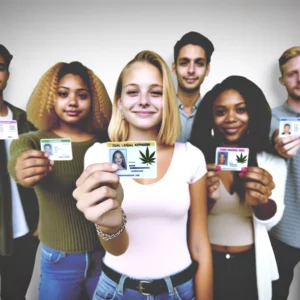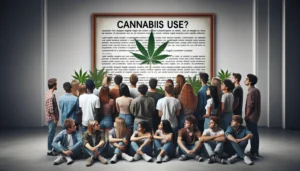The Legal Lowdown on Cannabis: What’s the Right Age?
 With the widespread changes in cannabis legislations across the globe, users and non-users alike are grappling with questions about the right time to partake. Should the legal age for cannabis use be younger, to fall in line with alcohol and tobacco, or older, to minimize potential negative impact? This discussion is pertinent as it not only decides who can access cannabis legally but also reflects societal attitudes towards this often misunderstood plant. This blog post aims to explore the multifaceted dynamics of legal cannabis use ages and their implications for individuals and society as a whole.
With the widespread changes in cannabis legislations across the globe, users and non-users alike are grappling with questions about the right time to partake. Should the legal age for cannabis use be younger, to fall in line with alcohol and tobacco, or older, to minimize potential negative impact? This discussion is pertinent as it not only decides who can access cannabis legally but also reflects societal attitudes towards this often misunderstood plant. This blog post aims to explore the multifaceted dynamics of legal cannabis use ages and their implications for individuals and society as a whole.
Understanding Cannabis Legislation
Cannabis, scientifically known as marijuana, has a long and varied history of legal status. What affects legislative decisions today is a complex mix of social, economic, and medical considerations. But at the heart of these discussions is the desire to regulate access and consumption.

Why Regulate Cannabis?
The regulation of cannabis aims to address multiple issues. One is the disharmony between different jurisdictions, where the use and distribution of a substance can be legal in one area and illegal in another. Regulating cannabis also seeks to fight against the black market that often arises in the absence of legal oversight, as well as to generate tax revenue. However, the most significant aspect is the public health and safety of the individual.
The Role of Legal Age
The establishment of a legal age reflects policy-makers’ views on when a person is considered mature enough to handle the potential risks of using cannabis. It serves as a guideline not just for users but for sellers and law enforcement as well.
Global Perspectives on Legal Age for Cannabis Use
Global attitudes and approaches towards cannabis vary greatly. Some countries have very conservative laws, while others have embraced a more liberal stance, allowing the use of cannabis for various reasons at a young age.
North America leads the Pack
In Canada, the legal age for cannabis use ranges from 18 to 21, depending on the province or territory. The United States, on the other hand, has a patchwork of laws with the general legal age being 21, reflecting the trend of alcohol consumption. However, medical cannabis may be accessed by individuals as young as 18 in some states.
The European Tolerance Strain
European attitudes toward cannabis use have been historically more permissive. The Netherlands, famous for its “coffee shop” culture, allows the purchase and possession of cannabis from the age of 18, although there are restrictions on the amount. Meanwhile, countries like Spain and Italy have seen a surge in cannabis clubs that cater to adult users.
Uruguay’s Innovative Approach
The South American nation of Uruguay made history by becoming the first country to fully legalize cannabis, with the legal age set at 18. This landmark move was backed by the belief that state control would minimize illicit use and trade.
Factors Influencing the Legal Age
Determining the legal age for cannabis use is a complex matter that involves a range of societal, health, and legal factors.
Public Health and Safety
The most significant consideration for many policy-makers is the health and safety of young adults. There is a mounting body of evidence suggesting that early cannabis use can lead to a range of adverse outcomes, including increased risk of developing other substance abuse disorders and potential impacts on brain development.
Comparisons with Alcohol and Tobacco
Critics of higher legal cannabis ages often point to the lower legal ages for alcohol and tobacco, suggesting that these substances are equally or more harmful. However, others argue that cannabis is distinct and should be treated as such, especially given its often more potent forms today.
Societal and Cultural Norms
Legal ages for substance use often reflect societal norms and values. In some cultures, there is a long tradition of using cannabis in spiritual or social contexts from a young age. Conversely, others view a higher legal age as necessary to preserve societal health and productivity.
Implications of Underage Cannabis Use
The risks and consequences of underage cannabis use are not to be underestimated and have led to stringent legal frameworks in some regions.
Health and Development
Cannabis use during adolescence, a critical period for brain development, can have long-term repercussions on cognition and academic performance. What’s more, young users are more likely to experience mental health issues and use other drugs.
Legal and Social Stigma
Criminalization of underage cannabis use can have devastating effects, ranging from legal repercussions like juvenile detention to lifelong social stigmatization.
The Debate Around Setting the Legal Age
The question of 18, 21, or anywhere in between is far from settled, and there are compelling arguments on both sides of the debate.
Advocates for a Lower Legal Age
Supporters of a lower legal age often frame the issue in terms of personal freedom and responsibility. They argue that treating adults at the legal age for other substances is inconsistent and that responsible use should be learned early.
The Case for Raising the Legal Age
Meanwhile, advocates for a higher legal age emphasize the potential health risks and the need to protect young, developing brains. They assert that delaying access to cannabis can reduce the likelihood of problematic use patterns.
Expert Opinions and Findings
There have been numerous studies and commissions that have weighed in on the topic, with no clear consensus. Experts’ opinions range from setting the age to 25, coinciding with the end of brain development, to the understanding that responsible use can be taught effectively from an earlier age.
Conclusion
 The decision of when to allow individuals to legally access and use cannabis is laden with nuance and significance. It speaks to larger societal questions about personal liberty, public health, and cultural attitudes. What remains clear is the importance of informed decision-making and robust education that equips individuals with the knowledge to make responsible choices, regardless of the legal age at which they choose to do so. For enthusiasts eager to engage with cannabis in its various forms, a comprehensive understanding of the law in their area is paramount, but so too is an eagerness to learn and respect the plant. The right age for cannabis use may never be universally agreed upon, but a holistic and community-oriented approach to the conversation can foster a more nuanced and balanced approach to policy and practice.
The decision of when to allow individuals to legally access and use cannabis is laden with nuance and significance. It speaks to larger societal questions about personal liberty, public health, and cultural attitudes. What remains clear is the importance of informed decision-making and robust education that equips individuals with the knowledge to make responsible choices, regardless of the legal age at which they choose to do so. For enthusiasts eager to engage with cannabis in its various forms, a comprehensive understanding of the law in their area is paramount, but so too is an eagerness to learn and respect the plant. The right age for cannabis use may never be universally agreed upon, but a holistic and community-oriented approach to the conversation can foster a more nuanced and balanced approach to policy and practice.


